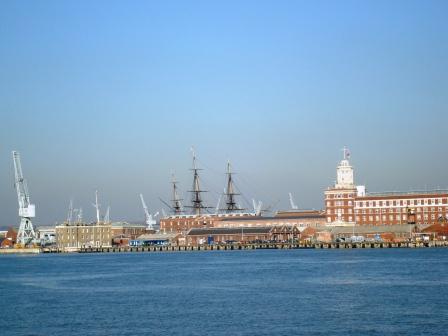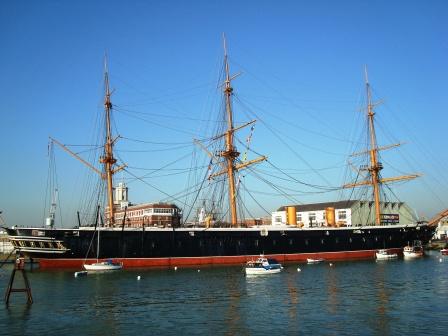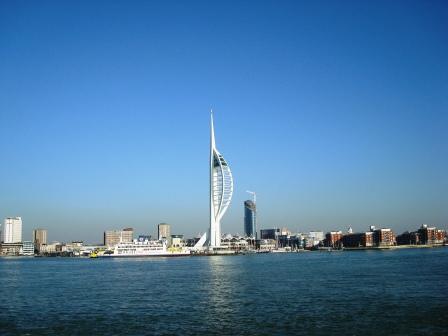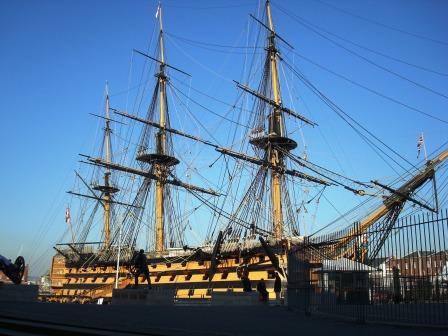 I have begun making my way through the Patrick O’Brian series again. Huzzah!
I have begun making my way through the Patrick O’Brian series again. Huzzah!
I can’t always be reading Ambrose, Augustine and Missalia Romana, after all.
We begin with Master and Commander.
It has been some years since I have read these. If you haven’t read them, you’ll love them!
This time I got the audio recordings also, from the library, to help while I am puttering around with chores or in the car. The reader is pretty good!
I was inspired by my latest visit to Portsmouth. Greetings to Fr. Joe in Fareham!

“To Portsmouth! To Portsmouth! It is a gallant town…”



HMS VICTORY!



































Father,
I have been engaged on the same re-reading exercise since New Year and am currently up to the Ionian Mission. I find the books a marvellous source of education in so many fields as well as sheer joy in the stories so masterfully told and characters so brilliantly brought to life. Give you joy of your reading Father- with all my heart.We have a beautiful blue sky morning here in Brisbane Australia.
It’s a small world, Father, as I’m reading “Post Captain” myself at the moment. I’d recommend Dean King’s companion dictionary, “A Sea of Words” if your 18th/19th century seafaring vocabulary is not as salty as it could be.
“Huzzah” is one phrase that just kills me. I just have to say it.
As a part of my job, I am confined to a car for many hours per month. For several years now I have listened to Patrick Tull spin the O’Brian series via audio CD. I have listened to many books in my travels and surmise that Tull is most talented and tells the stories exceptionally. Truly the most enjoyable audio series I have listened to. (Well perhaps the Lord of the Rings should be considered here.) The Master and Commander series has been a most enjoyable escape.
Chris
St. Agnes Parish
I started reading the Obrian series, and I couldn’t understand all of the nautical lingo, so I decided just to read “The Far Side of the World”, since it was that movie that motivated me to attempt the novels. Sad to say, even that novel was moving too slowly for me to enjoy.
I usually enjoy British authors, so I was disappointed with OBrian’s books. I love Agatha Christie, Sir Arthur Conan Doyle, Hillaire Belloc, C.S. Lewis, J.R.R. Tolkien, Michael Davies, and G.K. Chesterton. Oh well, I guess the sun doesn’t rise and fall in the UK like I thought.
RichR; I highly recommend them, but start from the beginning , Master and Commander.
The books involve a marvelous character development.
But don’t think they easily fit together with the other English authors you mentioned.
I love this passage from \”The Fortune of War\” describing Dr. Stephen Maturin\’s attendance at Sunday mass as a prisoner of war in Boston:
\”He hurried into his clothes, but even so the priest was on the altar by the time they reached the obscure chapel in a side-alley, and crept into the immensely evocative smell of old incense. There followed an interval on a completely different plane of being: with the familiar ancient words around him, always the same, in whatever country he had ever been (though now uttered in a broad Munster Latin), he lived free of time or geography, and he might have walked, a boy, into the streets of Barcelona, blazing white in the sun, or into those of Dublin under the soft rain.\”
Great stuff, beautifully expressed. O\’Brian is not your average writer of swash-buckling novels.
I’m not sure about starting with Master and Commander. I did, and hated it. I was put off reading any more for quite a while but the fact that so many people whose opinion I trust enjoy this series made me try again. I got Post Captain and loved it.
O’Brian’s style can be a bit confusing at first, I think the way that he tends to write around events rather than describe them bluntly can make him seem obscure. And then you have the nautical language….. I still don’t know what it all means, and I don’t care.
Post Captain is wonderful – it begins on land, so no nautical terms, and there’s a fair bit of humour, and later there are some hilarious scenes with Maturin (or so I think) and his pets. I went back to Master and Commander and enjoyed it. Don’t give up on O’Brian without reading Post Captain. If you still don’t get him, then OK.
Gave Post Captain to my Dad for Father’s Day and he whizzed through the lot, and has now read them all three times.
Fr Z – the third pic down, is that the Warrior? We went to a company dinner there some years ago, sitting at the long tables like the regular sailors! It’s a great place to hire for a party.
Did you see the Mary Rose?
Father: You may enjoy reading (if you have not already!): C.S. Forester’s “Horatio Hornblower” series, Richard Henry Dana Jr. “Two Years Before the Mast” or Dampier’s “William Dampier Bucaneer Explorer”, The Folio Society of London issued a lovely volume of Dampier in 1994 edited by Gerald Norris.
None of them are as technical as O’Brian but they are decent seafarin’ yarns. Forester’s Hornblower novels have very good character development and good story. The A&E series and the film with Gregory Peck took many liberties with the books.
I’m partial to Stevenson’s “Treasure Island” too! :-)One is never too old to read that classic, IMHO
I’m a HUGE seafarin’ yarn fan. I could talk ship and sea all day.
For those put off by Royal Navy and Age of Sail parlance and jargon, get a copy of Brian Lavery’s “Nelson’s Navy”. It is an education in itself. There are several other good general sorts of resources (for which I would have killed when a HS student in the 70’s having read, and become hooked upon, the Hornblower novels). Beyond this, there are specialist tomes with loads of information and draughts of all sorts of vessels of the age of fighting sail; crew size; armaments; deployment history; etc.
Father Z, watch out for Keyne and Abel in ‘Fortune of War,’ though they do come to the rescue of Steven Maturin.
Consider too (from the same novel):
“There followed an interval of a completely different plane of being: with the familiar ancient words around him, always the same, in whatever country he had ever been … he lived free of time or geography … ”
or
“They (Greek and Latin) are required in a physician, because the wisdom of the ages has found that they give a nimbleness of mind. They supple the mind, sir; they render it pliant and receptive.”
And yet, in the same novel, comes the wretched but joyful clench:
“In the Navy, we always choose the lesser of two weevils.”
What brought O’Brian to my attention was George Will’s obituary column several years back.
The Aubrey-Maturin world sounded so intriguing that I had to go get a copy of Master and Commander. It took a few chapters, but eventually I was hooked: the world of C.S. Forester, only with Austenesque prose and staggering attention to detail. If either of Austen’s admiral brothers had penned novels, you can’t help but feel this is what they might have come up with.
Key scenes of action can seem underplayed to those used to Hornblower; and the prose can be offputting to those who haven’t immersed in Austen or the like; the dense nautical terms can be dizzying to us landlubbers. But once you do, you truly are trundled off to another world. And it’s a dangerous and expensive world, because it’s not so much 20 novels as one long 20 part story which you’ll feel compelled to go all the way through. And it’s one which rewards close and repeated reading – the references can be obscure but brilliant, and the humor can be bone dry and subtle. There are great depths which are not (and could not be) touched on in the fantastic film version of Master and Commander – we immerse ourselvs in much of Georgian English society and many lands abroad, and dig far deeper into Aubrey’s and Maturin’s characters.
Anachronisms are essentially impossible to come by; and this means among other things it is a sympathetically Christian world, and sympathetic to the Church through the eyes of Stephen Maturin, as others have noted here.
Start from Master and Commander – and be patient with it. I don’t think you’ll be disappointed.
By far my favorite series is the “Richard Bolitho Novels” by Alexander Kent. I also like CS Forester’s Horatio Hornblower–I only wish he had written more!
Clare: Did you see the Mary Rose?
Yes, I did!
How are the many and manifest personal faults of my Munchausenesque clansman-by-desire “the price” of his books?
The price of his books is a dollar amount on the cover, sir.
I will not say that one should consider a man’s art totally apart from the man. But often, said art is a reflection of his better self, the self that he wished to be and wished others to be able to become. And indeed, the man’s art does both have value in itself — as beauty — and value to others — as an encouragement and entertainment. That does not pardon his sins; but it does stand as a good work (in this case, one he was clearly born to perform) for God, who is Beauty.
It is a miserable enough fate to be an artist serving Truth but not able to face up to it and tell it. I will not say the man’s art was worthless, when it was indeed the one great thing he served honestly.
Maureen are you refring to my earlier comment ??. Which seems to have “shiver me timbers” vanished !!!